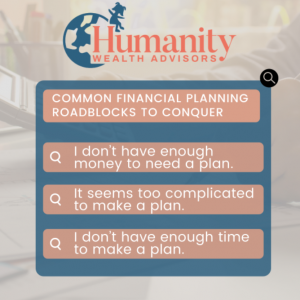Is it safe to say that you know you should be saving money, but when it comes to acting on it, you tend to fall short?
Perhaps you try, but bills, groceries, gas, and endless expenses siphon your savings until it’s dry, repeatedly. Do you tell yourself that once you get that next promotion you will start saving extra cash? Or, does money tend to find a way out as quickly as it comes in?
This tends to be the case for non-planners.
Another group of people save first, then spend what’s left after saving. These people know what they’re saving for and how much they need to put away based on the time to reach those goals.
These people are planners.
Help Increase your savings accounts with advice on financial literacy in the Bay Area.
As a fee-only firm providing affordable financial planning in the Bay Area, here’s what we think you should know about savings and planning for the future.
Savings Vs. Planning

Savings and planning are two sides of the same coin. A financial plan requires savings to meet the plan’s objectives (which is the whole point of having a plan in the first place). The two are inseparable.
If you schedule a consultation with a financial advisor near you, they will look at your current income and expenses and your goals for the future. They can help create a plan that takes you from Point A to Point B.
That plan will have various savings goals: an emergency fund, a 401(k), a new house or car, an IRA, etc. Those goals make up a significant portion of the plan and give you direction with your finances. The amount you need to save each month is laid out; if you fail to save for a month, you risk falling behind.
Those with a plan have a reason for saving and are far more likely to make it a priority.
Remember that just because someone has a plan doesn’t mean they’ll save as the plan directs them. And just because someone doesn’t have a plan doesn’t mean they won’t save anything.
Having a financial plan, and a reason for saving can significantly increase your likelihood of prioritizing your savings.
Most of us want to retire. You retire at the point where you can potentially live off your investments—your savings. You need a retirement plan, especially in uncertain times.
3 Ways Financial Planning Can Help
 Of the nearly 70% of Americans without a written financial plan, the most commonly cited roadblocks are:
Of the nearly 70% of Americans without a written financial plan, the most commonly cited roadblocks are:
- “I don’t have enough money to need a plan.”
- “It seems too complicated to make a plan.”
- “I don’t have enough time to make a plan.”
Today, almost everyone can afford to meet with top-tier financial advisors. If you live in the greater San Francisco area, look us up. We can help take the complex and time-consuming and make it simple, practical, and actionable.
Here are three reasons we think financial planning helps:
1. A financial plan can jumpstart savings.
The most commonly cited reason for not having a plan is a lack of funds. This shouldn’t be the case.
Financial planning doesn’t require large sums of money. A plan helps you identify and prioritize your savings goals, make it automatic, and accumulate resources no matter where you start.
Thanks to the power of compound interest, starting early is far more critical than how much you’re starting with. Your plan will include money for savings*—set aside for short-term goals—and money for investing*—set aside for long-term goals that may grow.
*Up to this point and beyond, when I talk about savings, I’m referring to money for savings and money for investing.

2. A financial plan leads to better money habits.
A financial plan isn’t just about investing, budgeting, and saving; it can also help give you confidence.
Once you work hard to generate savings, you’re going to be conscious of how to preserve that money. That means having an emergency fund, not carrying consumer debt, and being aware of potential fees.
There’s a spillover effect: a financial plan naturally leads to being more intentional about earning and spending your money.
3. A financial plan can increase confidence.
Do you feel financially stable?
This question asks if you feel confident that you will reach your financial goals. Frequently, those without goals or without a detailed plan for achieving goals do not feel financially stable.
However, doubt and uncertainty can dissipate once we create a roadmap to pursue all of our financial targets and track our progress.
A Few Things for Your Plan
Although our future dreams are different (your financial plan should look different from mine), a couple of common elements are retirement, estate planning, and education.
- Retirement – Almost all of us plan to retire one day. Here’s a newsflash: retirement isn’t an age; it’s net worth. Once your investments generate enough income for you to live off, you can retire; it doesn’t matter if you’re 80-years-old or 30.
- Estate Planning – Again, this isn’t just for the ultra-wealthy anymore. You might not need to set up irrevocable trusts or give millions to charity, but completing a will and assigning a power of attorney can be a part of your financial plan.
- Education – If paying your child’s college tuition or going back to school is in your future, you may want to look into 529 plans or other savings vehicles.
This list could go on and on; the point of mentioning these things is to get you thinking about the possible goals you may have for your own future.
If you don’t want to do this alone, a qualified independent financial advisor in the Bay Area can help ask the right questions to uncover what matters most to you. A plan may then be crafted with those ends in mind.
The Bottom Line
Financial knowledge is at your fingertips—take it. Creating a financial plan may sound like a chore. But, good financial decisions require a foundation from which you can understand and pursue your goals, regardless of your age and income level.
The potential value of quality financial advice, especially when we’re young, has incredible upside. Saving and investing doesn’t need to be complicated; work with an advisor you trust to build a plan based on your current lifestyle and your dreams for the future.
Don’t spend what’s left after saving. Prioritize your savings, prioritize your future, and spend the rest guilt-free, confident you’re on track to hit your financial goals.
Major financial decisions cannot go unaccounted for. Take charge of your life by becoming financially literate. Humanity Wealth Advisors is here to help!
HOMEWORK:
As a piece of homework, we invite you to cut one habit that costs you at least $50 each month. Whether you don’t get your nails done or dine out less, try it for 30 days. Then take that money not used and apply it to obtaining professional financial guidance.
Schedule an introductory call with Humanity Wealth to begin new financial behaviors. We look forward to hearing about your financial situation. Deep listening and advising are what we do best.
Investing involves risk, including possible loss of principal.” “Humanity Wealth Advisors and LPL Financial do not provide legal advice or tax services. Please consult your legal advisor or tax advisor regarding your specific situation.” “Prior to investing in a 529 Plan investors should consider whether the investor’s or designated beneficiary’s home state offers any state tax or other state benefits such as financial aid, scholarship funds, and protection from creditors that are only available for investments in such state’s qualified tuition program. Withdrawals used for qualified expenses are federally tax free. Tax treatment at the state level may vary. Please consult with your tax advisor before investing.




